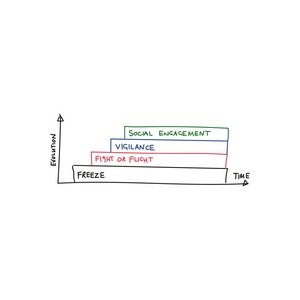Blog / Video #3
For many people the idea of socialising is fun. So how does it become something which is anxious for many others? Lots of us find this very upsetting, and confusing. We believe that we are supposed to enjoy socialising, and so if it makes us anxious, we think there is something wrong with us. But that’s not the biology of the body. If you understand the legacy of evolution properly you can see that socialising and anxiety are very close cousins. Here’s why.
Evolution has built up layers of our responses to threat. We started with freeze, then fight or flight, then extra vigilance. So now when we are confronted by threat, we go back through these stages one by one. However, there is yet another layer which is part of the way that more sophisticated organisms, like humans, work to avoid threat. We socialise.
Social Engagement System
Stephen Porges calls this the Social Engagement System. It is very different in the body to the vigilance which it replaces, but they are adjacent on the scale of evolved responses to threat. So, if you are finding that socialising isn’t working for you, vigilance (or anxiety) is the next rung back on the ladder of the body responding to threat.

The layers of evolved responses to threat
At first glance this can seem very confusing. Why would we socialise to avoid threat? Well, if we are all equally good at being vigilant, and running and fighting, then how could we get some evolutionary advantage to survive a threat? By being in the strongest gang of course, and not having other people be a threat to us. We socialise to create safe connections between each other, so that when things get tough, we have each other for support. This might sound super cynical, but it’s what is seen in the wild. Mammals compete to become the Alpha, and then they get all the women (or men), food and resources they want. This makes them more likely to survive and attack and to reproduce successfully. If you don’t believe me, just watch Love Island. It is all about becoming the social Alpha, and therefore getting the girl or boy.
The Tipping Point
So, when socialising isn’t easy, and therefore isn’t returning signals to the body that we are safe, the next gear to go to in the body is vigilance (or, anxiety). They can be so close that tipping from one to the other is all too easy and sudden. An unkind word or a look (a threat) can make us suddenly feel like all these other mammals are a danger, whereas a trusted friend, a kind touch or encouragement from a safe person, can make us exhale and restore us to enjoying people as a way to feel safer.
The difference is in the body. Literally. The Social Engagement System uses the Ventral Vagus Nerve, whereas the anxious vigilance uses the Sympathetic Nervous System. You don’ t need to remember that, but what you do want to know is how to hack the body so that you can stay in the former, and not the latter. Fortunately, it’s easy.
Hacking 1,2,3
Firstly, position yourself in the room so that you have as many mammals in front of you and as few behind you as possible. So, if you are sitting in a restaurant, sit with your back to the wall, or if in a classroom, in the back row.
Secondly, concentrate on your breath and make sure you breathe out for longer than you breathe in. do that 3-5 times. If you do both these things, you will restore your Social Engagement System. You can be social, not anxious.
Then look for safe people to take the next step with. If you find yourself drifting back to vigilance and anxiety, then go back to step one and do it again.
It works. You can enjoy people. It’s just your biology (your evolution) at work, not you or your personality. Give yourself a break and don’t worry, we are all the same!
You can download this post in a handy 2-page PDF to print and share with friends, family, clients or colleagues. Follow this link to download now.
You can buy a copy of The Invisible Lion now on kindle or paperback from your local Amazon store. Just click here to buy now.


